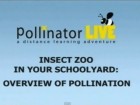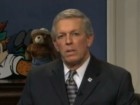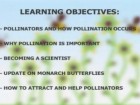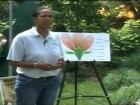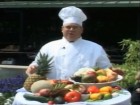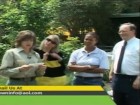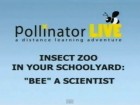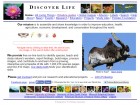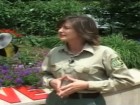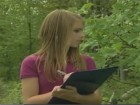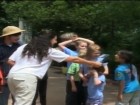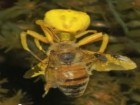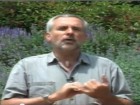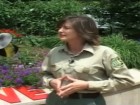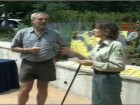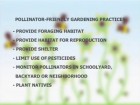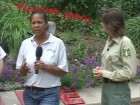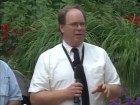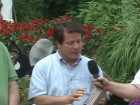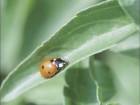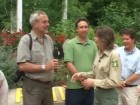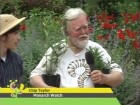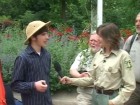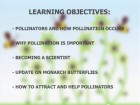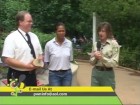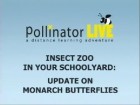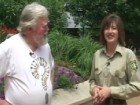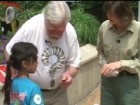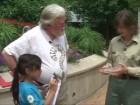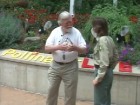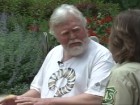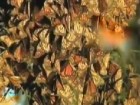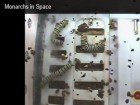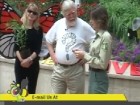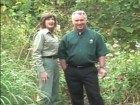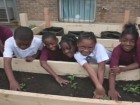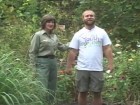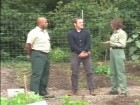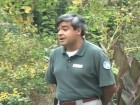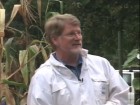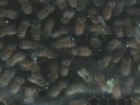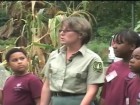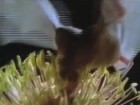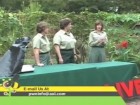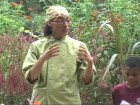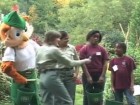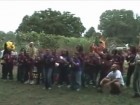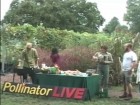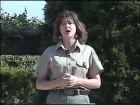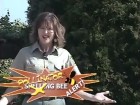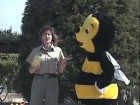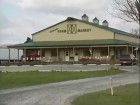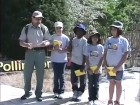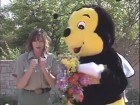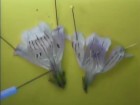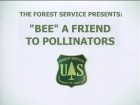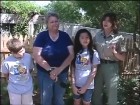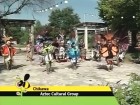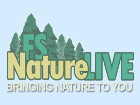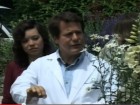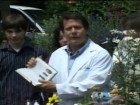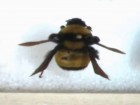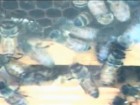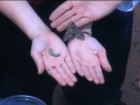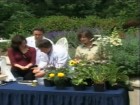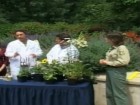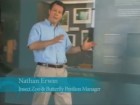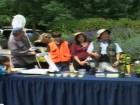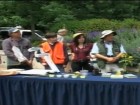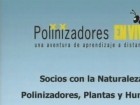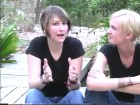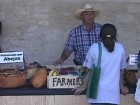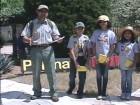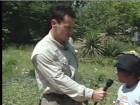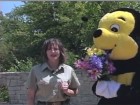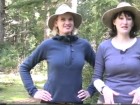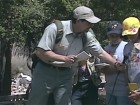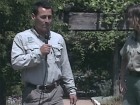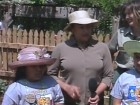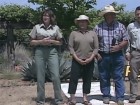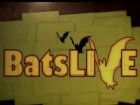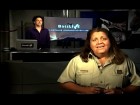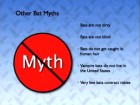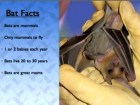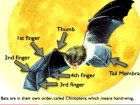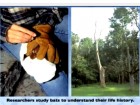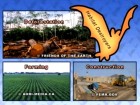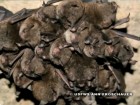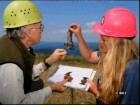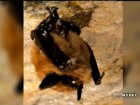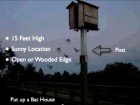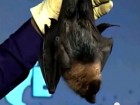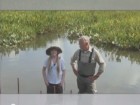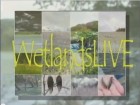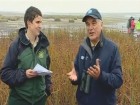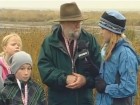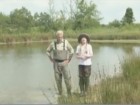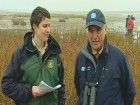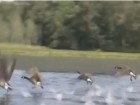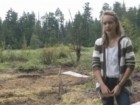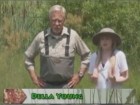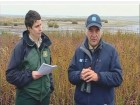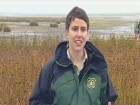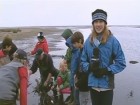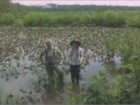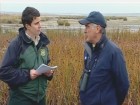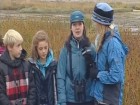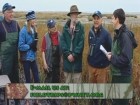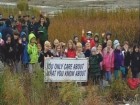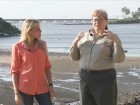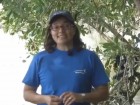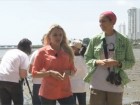Home>Video
Video
Learning objectives for the program
During the program, learn about pollinators, how pollination works, how to become a scientist, about monarch butterflies, and how to attract and help pollinators.
Segment
Original Air Date:
May 12, 2010
Web Site:
http://pollinatorlive.pwnet.org/
Insect Zoo in Your Schoolyard: Overview of Pollination
USDA Forest Service host Tamberly Conway introduces the webcast, “The Insect Z...
Welcome from USDA Forest Service Associate Chief
USDA Forest Service Associate Chief Hank Kashdan talks about the importance of p...
Learning objectives for the program
During the program, learn about pollinators, how pollination works, how to becom...
Electronic field trip technology
Electronic field trips enable you to take a distance learning adventure through ...
Overview of Pollination and Pollinators
Learn how plants are pollinated and how animals and insects help with that impor...
Questions and Answers from "Overview of Pollination"
Experts answer questions about pollination, what would happen if food plants are...
Insect Zoo in Your Schoolyard: “Bee a Scientist”
Dr. John Pickering, an ecology professor at the University of Georgia, talks abo...
Discover Life Web Site
Dr. Pickering explains the purpose of Discover Life and how to be a citizen scie...
How to Participate in Discover Life
This roll-in explains how to participate in Discover Life. ...
Discover Life Helps Catalog Insects
Discover Life catalogs and maps the locations of insects and other species....
Questions and Answers
Dr. Pickering discusses different types of bees, how to safely studying bees, ho...
Insect Zoo in Your Schoolyard: Attracting Pollinators to Your Schoolyard Garden
USDA Forest Service host Tamberly Conway discusses how to help pollinators....
Providing Habitat for Pollinators
Alan Peters with the Smithsonian National Zoo talks about how to provide habitat...
Providing Solitary Bees with Bee Boxes
Nate Erwin with the Smithsonian Natural History Museum talks about bee boxes....
Reduce Pesticide Use
Sean Brady with the Smithsonian Natural History Museum talks about the importanc...
Monitoring Pollinators
Dr. John Pickering with Discover Life stresses that it is important and interest...
Using Native Plants in the Garden
Dr. Chip Taylor, Executive Director of Monarch Watch, emphasizes how important i...
Summary of PollinatorLIVE Webcasts
USDA Forest Service host Tamberly Conway sums up the PollinatorLIVE webcasts....
Questions and Answers
Experts answer questions about pollinators, gardening, monarch butterflies, bees...
Insect Zoo in Your Schoolyard: Monarch Update
Dr. Chip Taylor, director of Monarch Watch, provides an update on the status of ...
Tagging Monarchs for Research
Dr. Chip Taylor, director of Monarch Watch, discusses the research results from ...
How to Tag Monarch Butterflies
Dr. Chip Taylor, director of Monarch Watch, explains how to tag a monarch butter...
How Butterflies and Bees See
Dr. Chip Taylor, director of Monarch Watch, explains how butterflies and bees se...
Monarch Migration
Dr. Chip Taylor, director of Monarch Watch, talks about monarch migration. ...
How to Help Monarchs
Dr. Chip Taylor, director of Monarch Watch, talks about threats to monarchs and ...
Monarchs in Space
Dr. Chip Taylor, director of Monarch Watch, talks about an experiment in which m...
Questions and Answers about Monarchs
Dr. Chip Taylor, director of Monarch Watch, answers questions about monarchs....
Introduction to Washington Youth Garden
Program director Kaifa Anderson Hall introduces the Washington Youth Garden....
Bees, Gardening and More: Native and Honey Bees
Naturalist Alonso Abugattas talks about native bees and their importance to poll...
Bees, Gardening and More: Bats, Butterflies and Other Insect Pollinators
USDA Forest Service entomologist and students go on an insect hunt....
Bees, Gardening and More: Pollinator Kitchen and Café
Top Chef Carla Hall cooks with foods developed as the result of pollination. ...
Introduction to Nature's Partners: Pollinators, Plants and People
The PollinatorLIVE electronic field trip was held at the Lady Bird Johnson Wildf...
Pollinator Bee
During the PollinatorLIVE program, students played a game and answered questions...
Plants and pollinators are partners
Native plants provide food for pollinators and other wildlife....
“Bee” a friend to pollinators
People can help pollinators by using pollinator-friendly practices....
How to help pollinators
People can help pollinators by planting native plants, providing habitat, partic...
Chikawa performs butterfly dance
The Aztec cultural group Chikawa performs a butterfly dance....
Insect Zoo in Your Schoolyard: Pollinator Partners
Sean Brady and Nate Erwin from the Smithsonian’s Natural History Museum and In...
Pollinator Partners
Plants depend on insects for pollination and are partners in this process....
Bee collection and honey bees
Bee collections help scientists and other study bees. A live honey bee hive is s...
Tour of the Smithsonian’s insect collection
Tour of the Smithsonian’s honey bee hive and insect collection and learn about...
Questions and answers about pollinator partners
Scientists answer questions about pollinators, insects, butterflies and more....
Vídeo Bug Chicks – Misión de Polinización
Las “Bug Chicks” hablará sobre la importancia de los pollinzadores ...
Mercado de Agricultores
Dos estudiantes visitan un mercado de agricultores y aprenden sobre la importanc...
Primer Grupo de Cientificos Estudiantes
Ramiro Villalvazo, Supervisor Forestal del Servicio Forestal Del Departamento de...
Tercer Grupo de Científicos Estudiantes – Jardin de Colores
Eddie McKenna y el tercer grupo de cientificos estudiantes observaran dos camas ...
Vídeo Bug Chicks – Plantas y Polinizadores son Increíbles Socios
Bug Chicks - “Las Chicas de los Insectos” nos ayuden a explicar cómo las p...
Observar y Anotar Datos con Ramiro
El equipo de científicos estudiantes, fueron de excursión con Ramiro a observa...
Observar y Anotar Datos con Eddie
El equipo de científicos estudiantes, fueron de excursión con Eddie y hablan s...
Ayudando a los Polinizadores, Ser Amigos de los Polinizadores
Las especies están disminuyendo, la Abejita de la Seguridad está llorando. Vea...
Científico Ciudadano
Tamberly habla sobre lo mucho que se puede hacer para los polinizadores como con...
Introduction to Bat Basics
Learn about bats, why they are important in the ecosystem, threats to bats and h...
Importance of Bats
Bats are important because they eat insects, spread seeds, pollinate flowers, an...
Myths about bats
Bats are not dirty, blind, or get caught in your hair when they fly. Vampire bat...
Scientific classification of bats (Chiroptera)
Bats are are classified as Chiroptera (meaning hand-wing) and subclassified as M...
Threats to bats
Threats to bats include natural predators, habitat loss, people, climate change,...
Additional Threats to Bats
Additional threats to bats include disturbance to roosts, maternity colonies, an...
White-Nose Syndrome is killing bats
White-Nose Syndrome is a new disease that has killed millions of bats....
How to help bats
Many activities can help bats such as recycling, buying locally grown food,
pro...
ClimateChangeLIVE Trailer
Get a quick look at the ClimateChangeLIVE distance learning adventure....
Wading into Wetlands Introduction
During the webcast, learn about what a wetland is, types of wetlands, the functi...
ClimateChangeLIVE Trailer
Watch the trailer to learn more about the ClimateChangeLIVE distance learning ad...
Wetland Plants and Macroinvertebrates
Students discover wetland plants and macroinvertebrates in the Boundary Bay estu...
Different types of wetlands
There are many different types of wetlands, although they can be classified into...
Wetland characteristics of Boundary Bay
Boundary Bay, Canada, is an estuary and exhibits all of the characteristics of a...
Student wetland restoration project in Stanley Park, Vancouver, Canada
Student Maja Lampa has restored a wetland bog in Stanley Park, which is located ...
Functions and importance of wetlands at Boundary Bay
Dr. Rob Butler discusses the importance of wetlands at Boundary Bay near Vancouv...
Questions and answers
A scientist answers questions from a school in Chicago and Panama about shorebir...
Seining in the eelgrass beds
A group of students show the fish they have found while seining in an eelgrass b...
Threats to Boundary Bay wetlands
Dr. Rob Butler reviews the threats to wetlands at Boundary Bay....
Experts answer questions
Experts answer questions at the end of the Wading into Wetlands webcast. ...
Close of “Wading into Wetlands” webcast
The host thanks the students and others for participating and learning about wet...
Introduction to WetlandsLIVE: Wetland Connections
During the webcast, learn about why wetlands are important for animals, especial...
What is a wetland?
Wetlands have three characteristics: water, low oxygen soils, and plants toleran...
Hammerhead sharks
Wetlands are nurseries for many animal species, including hammerhead sharks....



